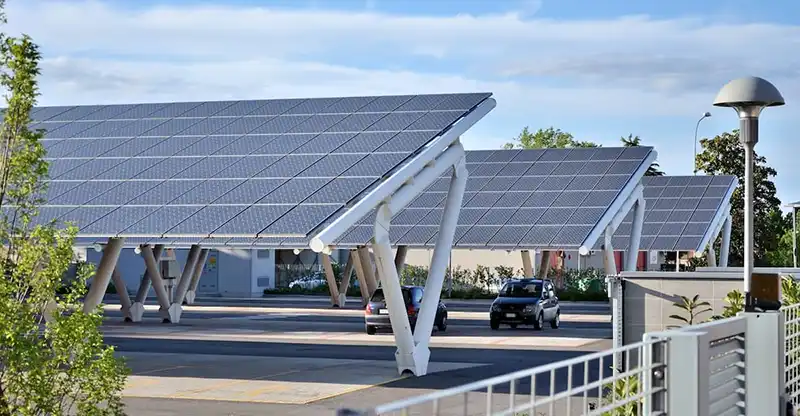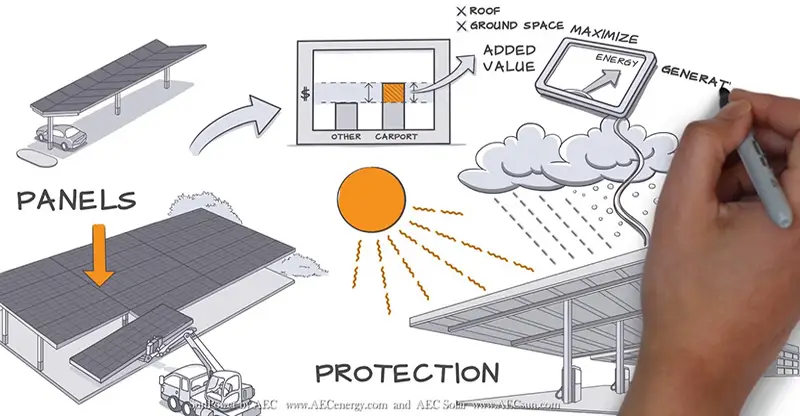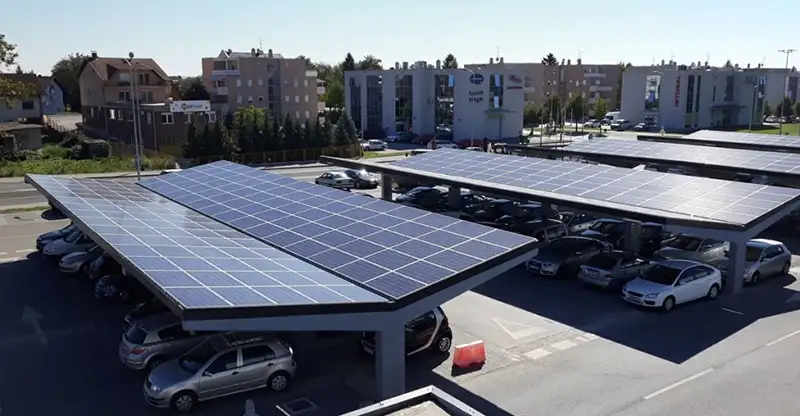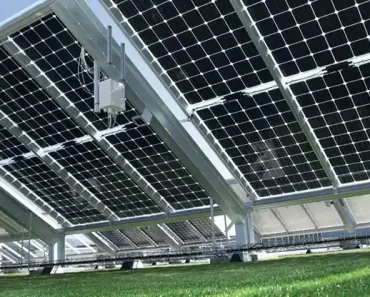
In recent times, solar carports have emerged as a notable trend within the renewable energy sector. Numerous solar integrators have incorporated these products into utility or large-scale commercial projects. Solar PV carports are especially advantageous when ground installations are impractical or when roofing systems are pre-existing.
Learn more about solar carports, including their benefits, drawbacks, and applications, by continuing to read the following text.
What is a Solar Carport?
A solar carport is a canopy equipped with solar panels, designed to shield vehicles from environmental factors. Typically constructed from stainless steel, it rests upon a concrete base, with solar panels integrated into its roofing to create an energy system.
By adopting solar carports, property owners can harness energy in pre-existing spaces either to sustain their current needs or to generate supplementary income through grid sales. Moreover, the dual function of solar carports, both as an energy source and a protective shield for vehicles, makes them particularly attractive to car dealerships.
Solar Carports vs. Non-Solar Carports
Constructing a garage can entail significant costs. For those primarily seeking to shield their vehicles from weather-related damage, a carport emerges as a more economical alternative. While carports may not offer the robust security features of a garage, they are suitable for those less concerned about security.
Traditional carports are constructed from materials like concrete, bricks, or wood, serving the primary purpose of vehicle protection. In contrast, solar carports are equipped with solar panels, offering not only a shelter for vehicles but also an energy source for homes.
Carport Systems + Bifacial Panels
The elevated design of a carport system permits greater ambient light, enhancing the efficiency of bifacial solar panels. For optimal utilization of this ambient light, it’s imperative that the panel cells remain unobstructed by shadows from the mounting system. Research by Trina Solar revealed power enhancement at various reflective levels: a gain of 24.6% was noted with a white-painted backdrop compared to a singular-faced module with a similar background, while sand registered an 11.81% gain, and grass 6.7%. Further investigations indicate that materials like white concrete, snow, and ice possess exceptionally high reflective properties.
How Do Solar Carports Work?

Solar carports harness solar energy using the same principles as standard ground-mounted or rooftop systems. Just like their counterparts, solar carports employ the photovoltaic effect, transforming light particles, known as photons, into electricity.
When a photon interacts with a solar cell, it releases energy that prompts electrons to move, creating an electric current. This process generates direct current (DC) power, a type familiar in battery-operated devices. An inverter then transforms this direct current into alternating current (AC), suitable for residential or commercial use.
Solar carports, while operating on similar technological principles as other solar installations, offer unique benefits. Firstly, they optimize unused overhead space in parking areas, eliminating the need for additional land. Secondly, their elevated positioning compared to ground-mounted systems ensures optimal alignment to capture solar energy efficiently.
In essence, solar carports present a more streamlined and efficient method of harnessing solar energy when compared to ground-mounted setups. For properties with limited space, solar carports provide an optimal solution to tap into renewable energy sources.
Solar Carport VS. Rooftop
Rooftop solar panels present an efficient means of power generation, yet many property owners face challenges in harnessing optimum solar energy due to factors like limited space, roof angle, and obstructions. For properties with space constraints, ground-mount systems might not be feasible. This is where solar carports come into play.
However, solar carports should not be perceived merely as an alternative for those who cannot adopt ground or rooftop configurations. In certain scenarios, they might even prove more economical. By utilizing previously untapped overhead space, solar carports afford greater latitude in determining the optimal orientation for solar panels.
One of the primary advantages of solar carports is that they bypass the complications posed by traditional roofs, such as angle, shading, orientation, and size constraints. Their structural design is tailored to ensure maximum exposure to sunlight, a feature most conventional roofs cannot guarantee.
Furthermore, when considering maintenance, solar carports offer a distinct edge. Should a roof require repairs within the tenure of a rooftop solar system’s warranty, there won’t be any supplementary expenses linked to the disassembly and reinstallation of the solar system. This concern is non-existent with solar carports.
Additionally, carports provide vehicles protection against various environmental factors, ranging from intense sunlight to rain and snow. Sheltering vehicles can also result in better fuel efficiency since there’s a reduced reliance on air conditioning to cool the car’s interior. Solar carports amplify these benefits by not only safeguarding vehicles but also generating clean energy for the associated property.
Advantages of Solar Carport

Vehicles remain stationary for about 95% of their lifespan, and the areas designated for parking them significantly consume urban space. In fact, open parking zones account for nearly 40% of cities’ paved regions. Devoting a significant portion of one’s land solely to accommodate a seldom-used vehicle is hardly an optimal financial decision. Yet, solar carports, with their multifaceted benefits, present a compelling alternative.
1. Reduction in Energy Costs
Solar carports can substantially diminish, if not outright nullify, your energy expenditures. The ample area they provide for solar panels ensures the generation of considerable power, sufficient to cater to household needs.
2. Facilitation of Electric Vehicle Charging
Beyond merely serving organizational EVs, these carports can be equipped with EV charging stations, enabling employees and guests to power their electric vehicles using the energy harvested by the photovoltaic systems.
3. Vehicle Protection Against Environmental Hazards
Beyond the evident economic and ecological perks, there’s a fundamental utility to solar carports: safeguarding vehicles from the vagaries of the weather. For residents in areas prone to precipitation or snowfall, these carports provide invaluable protection. Moreover, while offering shade, they can also be instrumental in rainwater harvesting.
4. Optimal Space Utilization
Solar carports, in comparison to ground-mounted solar systems, enable more efficient spatial utilization. Typically, they occupy the area earmarked for a conventional carport, thereby enhancing the functional use of the allotted space. This improved usage can amplify the productivity and convenience for staff, clients, and visitors alike.
5. Economic Advantages
Just as with rooftop and ground-mounted solar setups, solar carports contribute to reduced energy expenses, translating to considerable financial benefits for both businesses and homeowners. By curtailing energy expenditures and fostering consistent revenue streams, solar carports act as potent cost-saving mechanisms.
In certain regions, the surplus energy generated by these carports can be either exchanged for monthly bill credits or sold back to the electricity grid at potentially higher rates than the purchasing cost of power.
6. Enhanced Energy Production
A distinguishing feature of solar carports, compared to traditional solar systems, is their installation angle. The angle at which these panels are positioned directly impacts their sun exposure, thereby influencing their energy yield.
Roof installations often come with constraints regarding panel tilt and orientation. However, solar carports provide flexibility, allowing for optimal configurations to maximize both sunlight reception and energy generation.
7. Streamlined Maintenance
Solar carports, akin to their ground-mounted counterparts, offer a more convenient maintenance experience than rooftop systems. Their accessibility facilitates effortless removal of snow or debris and simplifies routine cleaning without the challenges posed by steep roofs. Additionally, should a residential roof require any repairs, there’s no need to dismantle any panels, further easing the upkeep process.
Disadvantages of Solar Carport

Despite the myriad benefits of solar carports, there are several considerations that might render them less suitable for certain circumstances:
1. Constructing New Structure
While a solar carport can offer significant energy savings over time, the initial installation might be costly. If you already possess a carport, its roof pitch might be inadequate for hosting solar panels effectively. These panels require specific angling to optimally harness sunlight and convert it into power.
2. Initial Financial Outlay
The solar panels themselves, for a standard 5KW system, are priced around $16,000 to $18,000 on average. The structural framework of the solar carport, designed to accommodate these photovoltaic (PV) panels, comes with an additional cost of approximately $2,500. However, depending on your electricity consumption patterns, this investment could potentially be recouped in as little as two or three years.
3. Ongoing Maintenance Expenses
To ensure optimal performance, solar panels necessitate regular maintenance. An annual professional inspection, typically priced around $150, is recommended. Furthermore, the panels require routine cleaning to maintain their efficiency and output.
Conclusion
Solar carports are distinguished by their dual functionality, they produce clean energy and simultaneously shield vehicles, optimizing space utilization. As the demand for self-generated energy and electric vehicles surges among individuals and businesses, the market potential for solar carports grows significantly. This efficient solution serves as an alternative to conventional ground-mounted and rooftop solar PV systems by providing protection for vehicles while harnessing renewable energy.







